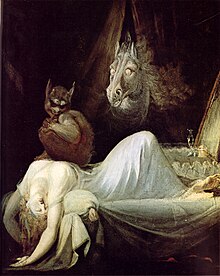incubus
Appearance
See also: Incubus
English
[edit]
Etymology
[edit]From Late Latin incubus, from Latin incubō (“nightmare, one who lies down on the sleeper”), from incubō (“to lie upon, to hatch”, from in- (“on”) + cubō (“to lie down”)).
Pronunciation
[edit]- (UK, General American) IPA(key): /ˈɪŋ.kjʊ.bəs/, /ˈɪn.kjə.bəs/
Audio (US): (file) Audio (General Australian): (file) - Homophone: incubous
Noun
[edit]incubus (plural incubi or incubuses)
- (mediaeval folklore) An evil spirit supposed to oppress people while asleep, especially to have sex with women as they sleep.
- A feeling of oppression during sleep, sleep paralysis; night terrors, a nightmare.
- Synonym: nightmare
- Burton with W.H. Gass, The Anatomy of Melancholy, NYRB Classics ser. (New York: New York Review Books, 2001, orig. 1932), →ISBN, vol. 1, p. 249:
- it increaseth fearful dreams, incubus, night-walking, crying out, and much unquietness […] .
- (by extension) Any oppressive thing or person; a burden.
- August 1935, Clark Ashton Smith, Weird Tales, "The Treader of the Dust":
- Again he felt the impulse of flight: but his body was a dry dead incubus that refused to obey his volition.
- 1949 March and April, F. G. Roe, “I Saw Three Englands–2”, in Railway Magazine, page 82:
- Ahead of us the lowering smoke-screen of Leeds and her gloomy satellites hung like an incubus over the land.
- 2002, Colin Jones, The Great Nation, Penguin, published 2003, pages 132–3:
- Notions of civic virtue were at that moment changing, in ways which would make of Louis's alleged vices an incubus on the back of the monarchy.
- August 1935, Clark Ashton Smith, Weird Tales, "The Treader of the Dust":
- (entomology) One of various of parasitic insects, especially subfamily Aphidiinae.
Translations
[edit]an evil spirit
|
a nightmare
|
oppressive thing or person; a burden
|
See also
[edit]Further reading
[edit]Dutch
[edit]Etymology
[edit]From Late Latin incubus, from Latin incubo (“nightmare, one who lies down on the sleeper”), from incubare (“to lie upon, to hatch”).
Noun
[edit]incubus m (plural incubussen or incubi, diminutive incubusje n)
Synonyms
[edit]- (nightmare) nachtmerrie
See also
[edit]- succubus m
Latin
[edit]Etymology
[edit]From incubō¹ (“I lie upon”, “I brood over”, “I am a burden to”), perhaps via an alteration of the Classical incubō² (“incubus”, “nightmare”).
Pronunciation
[edit]- (Classical Latin) IPA(key): /ˈin.ku.bus/, [ˈɪŋkʊbʊs̠]
- (modern Italianate Ecclesiastical) IPA(key): /ˈin.ku.bus/, [ˈiŋkubus]
Noun
[edit]incubus m (genitive incubī); second declension
- (Late Latin) the nightmare, incubus
- (Can we find and add a quotation of Augustine of Hippo to this entry?)
- (Can we find and add a quotation of Isidore of Seville to this entry?)
Declension
[edit]Second-declension noun.
| singular | plural | |
|---|---|---|
| nominative | incubus | incubī |
| genitive | incubī | incubōrum |
| dative | incubō | incubīs |
| accusative | incubum | incubōs |
| ablative | incubō | incubīs |
| vocative | incube | incubī |
Synonyms
[edit]Descendants
[edit]- Dutch: incubus
- English: incubus
- French: incube
- German: Incubus
- Italian: incubo
- Portuguese: íncubo
- Romanian: incub
- Russian: инку́б (inkúb)
- Spanish: íncubo
References
[edit]- “incŭbus”, in Charlton T. Lewis and Charles Short (1879) A Latin Dictionary, Oxford: Clarendon Press
- INCUBI in Charles du Fresne du Cange’s Glossarium Mediæ et Infimæ Latinitatis (augmented edition with additions by D. P. Carpenterius, Adelungius and others, edited by Léopold Favre, 1883–1887)
- incŭbus in Gaffiot, Félix (1934) Dictionnaire illustré latin-français, Hachette, page 801/1.
- Niermeyer, Jan Frederik (1976) “incubo (genet. -onis), incubus”, in Mediae Latinitatis Lexicon Minus, Leiden, Boston: E. J. Brill, page 524/2
Categories:
- English terms derived from Proto-Indo-European
- English terms derived from the Proto-Indo-European root *ḱewb-
- English terms borrowed from Late Latin
- English terms derived from Late Latin
- English terms derived from Latin
- English 3-syllable words
- English terms with IPA pronunciation
- English terms with audio pronunciation
- English terms with homophones
- English lemmas
- English nouns
- English countable nouns
- English nouns with irregular plurals
- en:European folklore
- English terms with quotations
- en:Entomology
- en:Horror
- en:Insects
- en:Mythological creatures
- en:Sex
- en:Sleep
- Dutch terms derived from Late Latin
- Dutch terms derived from Latin
- Dutch lemmas
- Dutch nouns
- Dutch nouns with plural in -en
- Dutch nouns with Latin plurals
- Dutch masculine nouns
- Latin terms derived from Proto-Indo-European
- Latin terms derived from the Proto-Indo-European root *ḱewb-
- Latin 3-syllable words
- Latin terms with IPA pronunciation
- Latin lemmas
- Latin nouns
- Latin second declension nouns
- Latin masculine nouns in the second declension
- Latin masculine nouns
- Late Latin
- Requests for quotations/Augustine of Hippo
- Requests for quotations/Isidore of Seville
- la:Sleep
